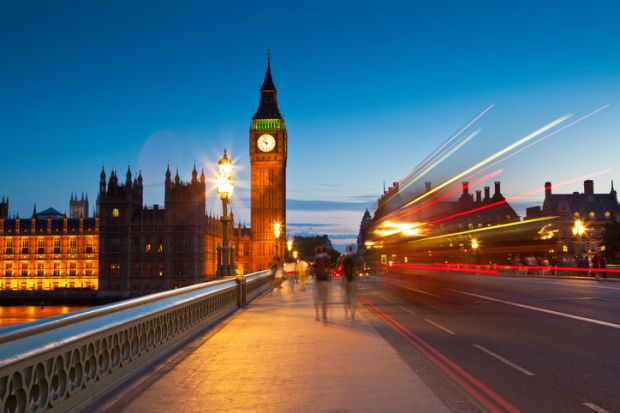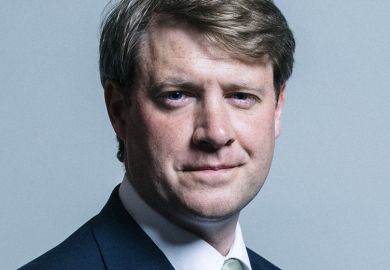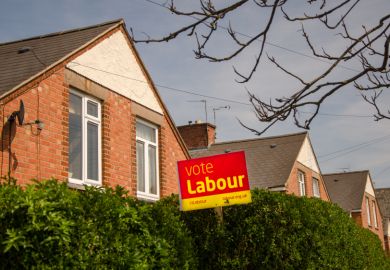Three of the major parties at Westminster outlined their research policies and funding commitments, and were warned of the need to repair the “huge reputational damage” caused to UK science by Brexit.
An election hustings was held at the Royal Society in London on 19 November, where the society’s president, Venki Ramakrishnan, warned representatives of the Conservatives, Labour and the Liberal Democrats that young scientists were already “reluctant to choose the UK” because of the damage to its standing as an “open and global” science nation.
Chi Onwurah, Labour’s shadow minister for industrial strategy, science and innovation, who spoke first, told the event that the party would draw on the work of innovation economist and UCL professor Mariana Mazzucato to avoid “false choices between the market and the state” and instead foster “public and private sectors working together towards a genuine long-term vision”, she said.
Referencing the title of one of Professor Mazzucato’s books, Ms Onwurah said: “Labour will develop an entrepreneurial state. A government that’s prepared to step in and take risks to solve the economic and technological challenges we face, with the green industrial revolution at the heart of it.”
Labour’s commitment is to increase research and development investment to 1.85 per cent of gross domestic product within its first two years in office, then to 3 per cent by 2030, Ms Onwurah reiterated.
Warning that the North of England has “fewer science jobs than Cambridge”, she said that Labour’s planned National Investment Bank would spend a third of its £250 billion budget over 10 years on research and development “around the country”.
The government has been using European Union citizens as “pawns” in Brexit negotiations, Ms Onwurah said. “I don’t think it’s credible to say we can reverse that impact overnight, because it has damaged our reputation...The way a Labour government will address that is by ending the hostile environment [in immigration policy], having a more open, welcoming system, but also by putting science and innovation at the centre of our reputation,” she said. “That means by working with the European Union...but also internationally.”
Stephen Metcalfe, a Conservative who is a former chair of the Commons Science and Technology Committee, standing in for universities and science minister Chris Skidmore, told the event that the Tories had been “increasing science funding at a faster rate than any other government in history” in recent years.
He reiterated the goal set out by Boris Johnson, “to spend £18 billion of public money on research and development in the UK by 2024-25”.
By 2027, the Tories would raise research and development investment to 2.4 per cent of GDP “then move on to trying to achieve 3 per cent”, Mr Metcalfe said.
The Conservatives want to make the UK a “go-to place” for science, he added. On the immigration regime, Mr Metcalfe sad that as a non-minister he was able to say that “using artificial salary thresholds as an indication of skill level, I think is misguided. So I’m hoping that when we see the final shape of immigration policy, we will see that has been dealt with.”
Sam Gyimah, the former Conservative universities and science minister who is now the Liberal Democrat spokesman on business, energy and industrial strategy, said that the party recognises that “science requires international collaboration”. This means “collaborating with the EU and the rest of the world – we do not see those two as alternatives”, he added.
“We also consider that it is vastly important that the free movement of people…continues,” Mr Gyimah said.
He also said: “The Lib Dem position is essentially that we’re better off remaining in the EU when it comes to science.” Conservative immigration policy making non-EU and EU citizens subject to the same visa system would be “levelling down, not levelling up”, he warned. The movement of scientists and researchers should not be seen “as a problem to be managed”, Mr Gyimah added.
The event was co-hosted by the Royal Academy of Engineering, the Academy of Medical Sciences, the British Academy, the Campaign for Science and Engineering, the Foundation for Science and Technology, and the Royal Society.
The Scottish National Party was invited but declined to take part, the event was told.
Register to continue
Why register?
- Registration is free and only takes a moment
- Once registered, you can read 3 articles a month
- Sign up for our newsletter
Subscribe
Or subscribe for unlimited access to:
- Unlimited access to news, views, insights & reviews
- Digital editions
- Digital access to THE’s university and college rankings analysis
Already registered or a current subscriber?








